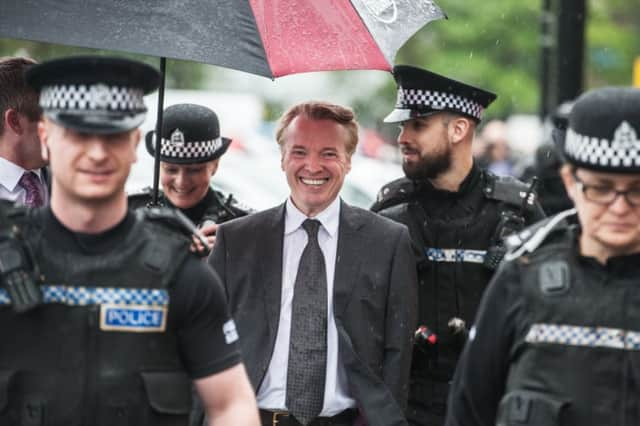Five key moments in the Craig Whyte trial


Following a six-week trial, a jury at the High Court in Glasgow returned a not guilty verdict by majority.
The court had been told by Advocate Depute Alex Prentice QC that Whyte didn’t have the authority over the money used in the takeover, though Donald Findlay QC, defending, described Whyte as ‘the fall guy’.
Advertisement
Hide AdAdvertisement
Hide AdThe high profile case has captivated the country, with a number of blockbuster moments that revealed the backroom drama behind Whyte’s takeover of Rangers.
Here are some of the biggest moments from the trial.
Rangers discussed administration
Donald Findlay suggested at the trial that the club was ‘already heading for a potential financial disaster’ even before Craig Whyte took over.
Former finance director Donald McIntyre gave evidence over two days at the trial, in which he was challenged on Rangers’ financial ‘predicament’ in 2011.
Mr McIntyre said that the topic of administration ‘undoubtedly cropped up’ as they faced the prospect of the so-called big tax case on the club’s use of Employee Benefit Trusts (EBTs)
Mr Findlay put it to Mr McIntyre: “By the time Mr Whyte is coming to buy the club the club was already heading for a potential financial disaster – before Craig Whyte even appeared on the scene.”
Dave King’s warning
The court learned near the start of the trial that the current man in charge at Rangers, Chairman Dave King, raised concerns about the source of the funds Whyte was using in the takeover.
Cross-examining former owner Sir David Murray, Donald Findlay recited a letter that was said to have been sent by Mr King to the takeover panel.
It it, Mr King, who is based in South Africa, wrote: “There is a concern at a proposal by Mr Craig Whyte to acquire a controlling interest in Rangers by purchase of the total share hold currently owned by Murray Group.
Advertisement
Hide AdAdvertisement
Hide Ad“There are concerns about the sources of the funds that are available for the potential acquisition and that this may lead to formal investigation by the policing authorities responsible for these matters.”
Ticketus ‘used before’
It emerged during the evidence by chartered accountant Mike McGill, a key ally of Sir David Murray, that the club had used the firm Ticketus to obtain funds before.
A key part of the prosecution case was that Whyte helped fund his takeover of Rangers by getting a loan from the company against three years of future season ticket sales.
Mr McGill said that the club had been led to believe that the money for the takeover deal had come from Whyte’s “personal resources”.
Mr McGill said there had been no desire to hide the club’s earlier involvement with Ticketus, but said that the prospect of using season ticket money to fund a takeover was ‘completely unpalatable.’
Other bids
The testimony of Mr McGill was also when the court heard of other potential bids that were received by the club along with Whyte’s.
The Murray Group had apparently become ‘extremely uncfomfortable’ after dealing with an offer that was funded by a Lithuianian bank.
Mr Mcgill said that there were concerns that the Balkan institution had been accused of being involved in organised crime and money laundering.
Advertisement
Hide AdAdvertisement
Hide AdIt was also cognisant, Mr McGill added, of the potential ‘furore’ given the ownership of another Scottish club (Hearts) by a Lithuanian.
Murray’s “desperation”
Some of the most arresting testimony came from Gary Withey, a lawyer who had acted for Whyte as he sought to buy Rangers.
The solicitor claimed that Sir David Murray was so desperate to conclude the deal that he did not seem to care where the financing came from.
Mr Withey said: “This was the only deal I have been involved in where the vendor was pushing more than the purchaser.
“They were desperate to get this deal over the line … they did not want the embarrassment of this thing not being completed.”
